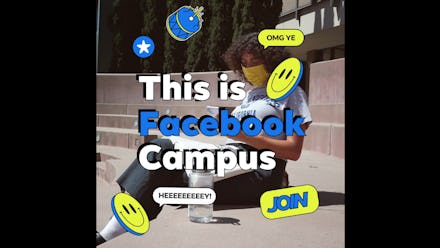Facebook's "Campus" might remind you of a time when the site wasn't a dumpster fire

Once upon a time, before it became a breeding ground for conspiracy theories and violent hate groups, Facebook was a social media platform for college students. Launched in 2004 to students on four Ivy League campuses, the site's popularity exploded, and it quickly expanded to 800 college campuses and 5 million active users by the end of 2005.
On Thursday, Facebook announced a return to its roots with the site's new service, Facebook Campus. This college-only section of the Facebook app aims to keep university students connected during a time when partial or fully remote learning can create distance between them. Students will need a university email and a projected graduation year to create a Campus profile that only Campus users can see.
At this time, Facebook Campus is doing a test run beginning with students at 30 schools, including Duke University, Johns Hopkins University, Georgia State University, and the University of Pennsylvania.
In its original iteration, Facebook was more close-knit than it is now. The site was more often used for connecting with friends at school than reading your aunt's wild political opinions, and Facebook hopes to recapture some of that feeling with Campus.
"It felt like more of an intimate community than it may be now for college students," Charmaine Hung, product manager for Facebook Campus, told CNET. The company began work on Campus before the pandemic, but its timing couldn't be more fitting. "When COVID-19 hit, we realized more than ever that this was a product that could really help students when they're remote."
Facebook Campus differs from regular Facebook by offering a campus-only newsfeed, directory, and chatroom. The newsfeed displays posts from classmates and information about events and clubs that can help students form virtual study groups or virtual meetups.
The campus-only directory allows students to find their classmates based on their major, class, year, and other details. Facebook hopes that this will help students find and keep in contact with each other. Chatrooms can be formed for clubs and groups as well.
But no matter how much Facebook wants to reminisce about simpler times, it's a company that's now known for having a lot of privacy issues. And, you know, racial issues, hate group issues, misinformation issues — the whole shebang.
To those concerns, the company has offered a few reassurances. Facebook Campus posts will stay private to those with Campus profiles within the students' school. Any "open" posts are only open to your classmates, not the public. The information students put on their profiles can be as vague or as detailed as they want. Chats can be deleted by hosts if they get out of hand, and blocking someone on Facebook will also block them on Campus.
These seem like pretty standard controls that might not fully address Facebook-ish problems like the spread of misinformation in chats (especially if it's moderated by someone who spreads it). College page managers can't access student chatrooms, either, so it sounds like Facebook is leaving it up to students to clean up. Which is certainly one way to do it, though possibly not the best way.
Then again, if Facebook knew how to handle these kinds of situations maybe it wouldn't have become the sort of place that loses employees due to "profiting off hate" and deals with virtual walkouts in response to its lack of moderation.